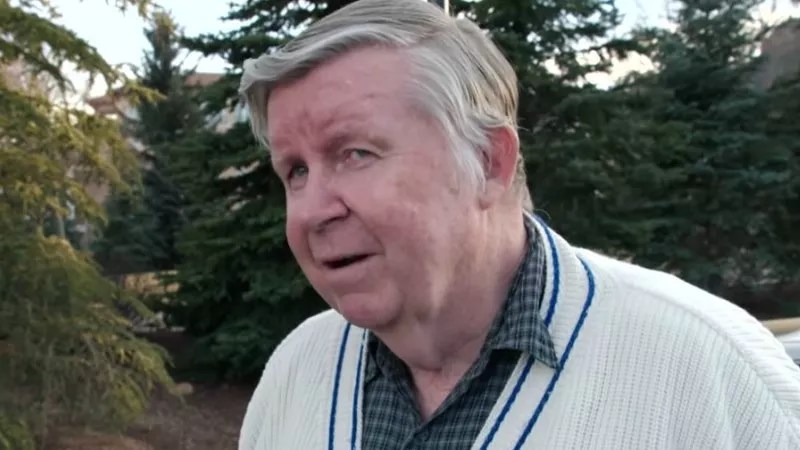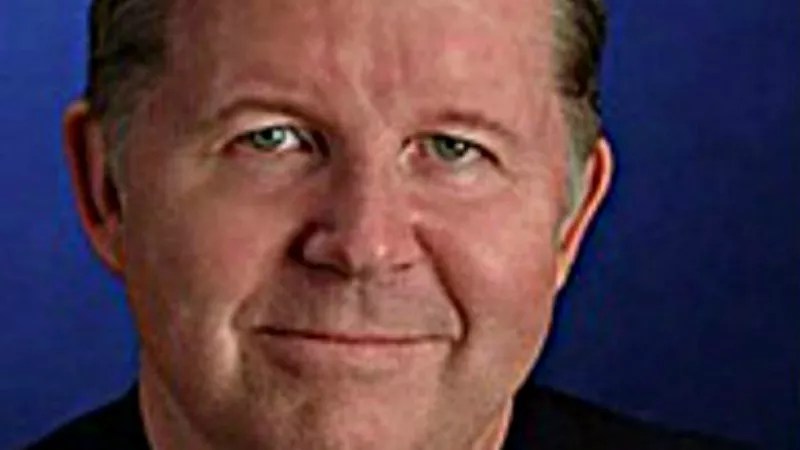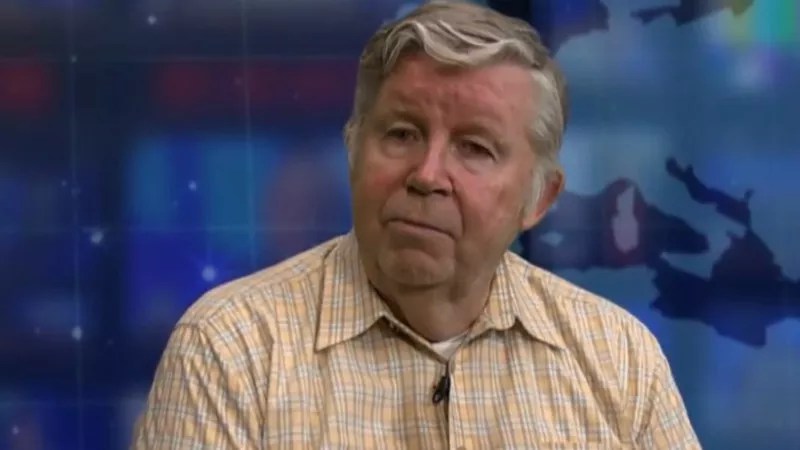
TBS via YouTube

Audio By Carbonatix
Love him or hate him, Douglas Bruce is undeniably one of the great characters in Colorado political history. Bruce’s most significant creation, 1992’s Taxpayer Bill of Rights (aka TABOR), continues to play a major role in state government, with proponents crediting it with saving Coloradans millions of dollars over the quarter-century since its passage and critics like TBS firebrand Samantha Bee blaming it for crippling the state’s education and transportation systems, among other things.
And while Bruce has taken plenty of hits in recent years, including two brief stints in jail, he continues to passionately promote conservatism of a particularly quirky sort, as evidenced by the voters’ guide for state ballot issues he’s created for the November 2018 election.
We asked Bruce to elaborate on his recommendations regarding the thirteen statewide measures that voters will decide in November; the original document is accessible below, along with a separate essay about gerrymandering hooked to amendments Y and Z, which he really, really hates. Get his takes on each below, following Colorado Secretary of State office links and brief descriptions of each measure.
Amendment V
Lower Age Requirement for Members of the State Legislature
Amendment V proposes amending the Colorado Constitution to lower the age requirement for serving in the state legislature from 25 to 21.
Bruce’s recommendation: No
“The age has been 25 for the House and Senate in Colorado since 1876 – and I don’t think people are necessarily more mature now. In fact, they have a longer maturation process now than they did 142 years ago. Back then, a tiny fraction of the population went on to higher education. But now, we have a large portion of what we’ll loosely call millennials who may stay in school for six years or more after high school. They’re not in the quote-unquote real world. There are jokes about them still living in their parents’ basement. But regardless, most of them aren’t working, most of them don’t know anything about the business world, most of them don’t have real experience paying taxes, most of them don’t own property. They’ve led a sheltered experience and they’re not really ready to lead.
“Some kid who may still be in school and is worried about his final exams isn’t ready to vote on laws that affect five and a half million people. So this is just basically a politically correct, populist proposal that Republicans had to vote for because Democrats were voting for it and they didn’t want to be perceived as anti-young people and crotchety old geezers. It’s a political stunt and it’s not needed.”
Amendment W
Election Ballot Format for Judicial Retention Elections
Amendment W proposes amending the Colorado Constitution to change the ballot format for judicial retention elections to remove the requirement that a retention question be asked for each justice and judge.
Bruce’s recommendation: No
“This is a solution in search of a problem. And it doesn’t solve a problem. It just creates confusion. We may have less voting on judges because of this when we need more voting and more accountability.
“We have a lot of problems with the judicial system. There’s this commission or panel that sends out things at voter expense telling people how to vote on judges. But it’s basically a popularity contest. They have all these surveys that basically justify the status quo and tell people to retain all the incumbents: ‘Oh, the clerks like him. The defense lawyers like him. So you should vote for him.’ That’s outrageous.
“This is a perfect example of something that doesn’t need to be a constitutional amendment. The system we’ve had for 142 years is working just fine. If it ain’t broke, don’t fix it.”

A vintage portrait of Douglas Bruce.
File photo
Amendment X
Industrial Hemp Definition
Amendment X proposes amending the Colorado Constitution to remove the definition of “industrial hemp” from the Colorado Constitution and, instead, use the definition in federal law or state statute.
Bruce’s recommendation: No
“Frankly, I don’t care about this. I don’t see a problem with either the statutory definition or the definition in Amendment 64, which is the original marijuana constitutional act. If you have a choice of one or the other, you can pass a statute defining what they mean by industrial hemp. So this amendment is microscopic. It doesn’t need to clutter up the ballot and it doesn’t need to amend the constitution for what voters already approved.”
Amendment Y
Congressional Redistricting
Amendment Y proposes amending the Colorado Constitution to create the Independent Congressional Redistricting Commission, consisting of an equal number of members from each of the state’s two largest political parties and unaffiliated voters, to amend and approve congressional district maps drawn by nonpartisan legislative staff; establish a process for selecting commissioners, new requirements for transparency and ethics, and a procedure for judicial review of commission maps; and establish and prioritize the criteria the commission must use for adopting the state’s U.S. congressional district map.
Amendment Z
Legislative Redistricting
Amendment Z proposes amending the Colorado Constitution to replace the Colorado Reapportionment Commission with the Independent Legislative Redistricting Commission, consisting of an equal number of members from each of the state’s two largest political parties and unaffiliated voters, to amend and approve state legislative district maps drawn by nonpartisan legislative staff; establish a process for selecting commissioners, new requirements for transparency and ethics, and a procedure for judicial review of commission maps; and expand and prioritize the criteria the commission must use for adopting state legislative district maps.
Bruce’s recommendation: No on both Y and Z
“These are all about gerrymandering, which both parties do. Everybody knows that. But when you have something that goes before the legislature on a very controversial power-politics subject and it passes 100-0, one of the two parties doesn’t get it. And in this case, it’s the Republican Party. If you Google the words ‘the Stupid Party,’ what you’ll get is about the Republican Party. Try it. It does. [Editor’s note: Bruce is right. Here’s the first article that came up.]
“I’ve been a registered Republican for decades, but since right after the Civil War, the Republican Party has been doing dumb things. And the Democrats are the party of government, so they know how to manipulate government and play government to their advantage – which is how they conned the Republicans into voting for this 100-0. We didn’t have even one sensible Republican who understood that they were being swindled on a semi-permanent basis, because when you have reapportionment, it lasts for ten years, until the next census. So unless they change the system, the Democrats will again control the system.
“The Democrats will clump Republicans into districts where they’ll win 65-35. But in districts that they laughingly call ‘competitive,’ they’ll make sure the Democrats will win 52-48. That’s what gerrymandering is about. And the commission is set up in a way to cement the two-party system, but also to give the Democrats an advantage.
“Four members are chosen by Democrats, four are chosen by Republicans, and the other four are unaffiliated. They make it clear that these people have no party. So officially, in the constitution, they’ll be able to discriminate against Libertarians, people from the Green Party, from the American Constitution Party. Those people can’t participate in the system. They’re considered less than an unaffiliated voter. They’re just banned. And the unaffiliated members are chosen by retired judges. But over the last 44 years, there’s only been one Republican governor – so that means that these judicial retirees will be heavily weighted in favor of Democrats. That rigs the system. If they wanted to do it honestly, they’d have a lottery drawing.
“What gerrymandering is all about is leaders picking their voters instead of voters picking their leaders. You can fashion a district that’s tailor-made to give you what you need to get by and have your party win. They talk about ‘communities of interest,’ which is a euphemism for taking into account racial elements or ethnic elements or some other things they can’t define. It basically lets them say, ‘This is going to be a district where the politician is black,’ and if he’s black, odds are nine to one that the legislator is going to be a Democrat. And they can do the same with Hispanics or any other community interest they come up with.
“On a nerdy level, I did research you won’t get from anybody else. Right now, in the original constitution, the section about reapportionment covers 1,313 words – and Y and Z together are more than 12,300 words. It’s almost ten times longer. And the entire state constitution is 71,000 words. So this would be a 17 percent gross addition to the constitution, not counting the 1,300 words they’d replace.
“One of the goals of Amendment 71 [a 2016 measure that makes it more difficult for amendments to be petitioned onto the state ballot] was to try to keep the constitution brief and short, and John Suthers, who used to be the Colorado Attorney General, was the spokesman for it on TV. But now he’s the spokesman for Y and Z, which are the longest proposed amendments in state history. So he wins the Hypocrite of the Year award.”

An illustration portraying Douglas Bruce as a bulldog.
Westword
Amendment A
Prohibit Slavery and Involuntary Servitude in All Circumstances
Amendment A proposes amending the Colorado Constitution to remove language that currently allows slavery and involuntary servitude to be used as punishment for the conviction of a crime.
Bruce’s recommendation: Yes
“They put this on the ballot two years ago and they did a crappy job. There was a description in the Blue Book that confused people, which is worse than saying nothing, and it lost. And this year, they were going to do the same thing again. They were using the same mediocre language. I went to the Blue Book hearing and told them, ‘Make it simple. Just put on the arguments for and the arguments against.’ And the argument for should say, ‘If you oppose slavery, you should vote yes on this ballot issue’ – period. That’s all there is to it. This is a vote on whether slavery’s a good thing. But instead, they went into a bunch of crap about how this may impact work-release programs. I told them, ‘This doesn’t affect work-release programs. It has nothing to do with that.’
“I finally got them to delete fourteen lines out of their draft, which is a hard thing to do. But they did make that change. Like I said, make it simple.”
Amendment 73
Funding for Public Schools
Amendment 73 proposes amending the Colorado Constitution and Colorado statutes to increase funding for preschool through twelfth grade (P-12) public education; raise the state individual income tax rate for taxpayers with taxable income over $150,000, and increase the state corporate income tax rate to provide additional funding for education; and for property taxes levied by school districts, set the assessment rate at 7.0 percent for residential properties and decrease the assessment rate to 24.0 percent for most non-residential properties.
Bruce’s recommendation: No
“They had an amendment like this on the ballot five years ago, Amendment 66, and it lost something like 60-40. But I don’t believe in being complacent – and on this one, they’ve done a number of bizarre things. I think they were high when they wrote it.
“They get rid of the flat income tax rate that’s in the constitution because of TABOR. They have six income tax brackets – five for individuals and a new, higher rate for corporations. They don’t have equal treatment for everybody, and that’s the only way you avoid the pressure to create loopholes. If you punish rich people for their success, that creates pressure and complicates the income tax returns. And it really complicates the property tax bills people will have. Talk to assessors: They’ll tell you it will create a big headache, because you’ll have an assessed rate for school districts and one for everything else. It’s a total mess.
“Teachers are supposed to be so knowledgeable, but Amendment 73 makes you wonder. They say it’s for the kids, but the kids get zip, nada. The kids are being used as hostages to get school district employees to share in $1.6 billion of loot. The majority of school district employees aren’t teachers – people don’t realize that – and if everybody gets the same pay raise, it’ll be something like $16,000 for everybody. And they don’t deserve a windfall just because they get enough signatures to get on the ballot.
“Either way, it makes no sense. The quality of education isn’t dependent on the amount of money you spend. Nationally, what’s spent on schools has tripled after inflation since the 1970s, and the schools are worse now than they were then. If you think you’ll write a check and Johnny or Sally will go to Harvard or Yale, well, it doesn’t work that way. You can’t buy education the way you buy a hamburger. And this doesn’t have anything to do with merit pay for teachers or getting rid of bad teachers or teacher tenure or parental-choice education or anything. It’s just saying, ‘Gimme.’ It’s a one-word ballot issue. Just a dumb idea. Socialism at its worst.”

A photo-illustration of Douglas Bruce by the inimitable Kenny Be.
Photo-illustration by Kenny Be
Amendment 74
Compensation for Reduction in Fair Market Value by Government Law or Regulation
Amendment 74 proposes amending the Colorado Constitution to require the state or a local government to compensate a property owner if a law or regulation reduces the fair market value of his or her property.
Bruce’s recommendation: Yes
“This is the only good idea from a citizen petition – and I’m Mr. Petition. Nobody has put more petitions on the state ballot in state history than I have. I definitely believe in the petition process, which is why Amendment 71 is such an outrage. But the rest of the crop this year is lemons.
“This is an issue of upholding property rights. If you have an apartment building on your property and the government says you can only use it for a single family home, they’ve destroyed most of the value of your property. And that’s wrong. That’s why I signed this petition and why I’m going to vote for it – because I believe in private property. Private property is the foundation of freedom. You can’t be free if your government controls all the property.
“I don’t want to sound paranoid or like a nut case, but specifically, Karl Marx said in chapter two of The Communist Manifesto, ‘Our goal is the abolition of private property.’ And they’re trying to do that on a small basis by strangling private property ownership so the government has more and more control. That’s why I support 74.”
Amendment 75
Campaign Contributions
Amendment 75 proposes amending the Colorado Constitution to increase campaign contribution limits when a candidate loans or contributes at least $1.0 million to his or her own campaign, by allowing all candidates in the same election to collect five times the level of individual contributions currently authorized in the state constitution.
Bruce’s recommendation: No
“This is another solution in search of a problem. If you have someone in the state who wants to spend $1 million of his own money, that’s okay. But you have these regulators who want to regulate how much other people can spend. I think the Blue Book said there are three examples in the last quarter-century this would have applied to. That’s why it’s stupid to put this into the constitution. It’s not needed.”
Proposition 109
Authorize Bonds for Highway Projects
Proposition 109 proposes amending the Colorado statutes to require the state to borrow up to $3.5 billion in 2019 to fund up to 66 specific highway projects; direct the state to identify a source of funds to repay the borrowed amount without raising taxes or fees; and limit the total repayment amount, including principal and interest, to $5.2 billion over 20 years.
Bruce’s recommendation: No
“This is by somebody who’s a political ally of mine, Jon Caldara of the Independence Institute. And he likes 109 because it’s better than 110 [see below], which is true. He prides himself on this proposal, which only violates one part of the constitution, and it does so without a tax increase. But the constitution prohibits state debt, which the TABOR amendment never changed. So it’s unconstitutional.
“Jon Caldara is going to be annoyed with me, but I told him about this a year ago. I said, ‘If you simply required the state to divert or transfer $260 million a year from existing funds for roads, I would have been for it. But he’s asking voters to violate the constitution and create debt that produces nothing. All the money goes to bond dealers, who are parasites living on the margins of society getting money for the super rich, who are happy with a 3 percent return on interest borrowed from the government. They love debt, because that’s what they deal with. If there was no debt, they’d be out of business.
“But you can’t borrow that money. The constitution says so. And I’m the kind of person who tells people what they don’t want to hear about what the constitution actually says. I commend spending more money on roads, but the ends don’t justify the means. This is fiscal child abuse.”
Proposition 110
Authorize Sales Tax and Bonds for Transportation Projects
Proposition 110 proposes amending the Colorado statutes to increase the state’s sales and use tax rate from 2.9 percent to 3.52 percent for 20 years; distribute the new tax revenue for transportation as follows: 45 percent to the state; 40 percent to local governments; and 15 percent for multimodal transportation projects; and permit the state to borrow up to $6.0 billion for transportation projects and limit the total repayment amount, including principal and interest, to $9.4 billion over 20 years.
Bruce’s recommendation: No
“Incorporate all the statements I made about 109 and add the fact that this would be taking away one of our few tax advantages to other states. We have a 2.9 percent state sales tax rate, which is the lowest of any state with a state sales tax; five or six states don’t have one, but of those that do, we have the lowest nominal amount. We won’t be anywhere close to that – and once they get their foot in the door, you know they’ll come back in fifteen or twenty years and say, ‘Let’s make it permanent. You still want roads, don’t you?’ There’s nothing more permanent than a temporary government program: Milton Friedman said that.
“Here’s a figure that should stand out to any normal person: Total state government spending is about $33 billion a year. They say it’s about $30 billion because they don’t count money that’s automatically appropriated – but they’re playing games. It’s really about $33 billion, and if you divide that by the 5.5 million people who live in Colorado, that’s about $6,000 for every man, woman and child. Multiply that for a family of four and that’s $24,000.
“Another problem with 110 is that it doesn’t set priorities. It just piles on additional cash and implies that there’s no waste in government. But there’s a lot of waste in government, and everything can’t be free. We can’t afford to give everybody free health care and free housing and free education and free roads and free everything without realizing that the purpose of the legislature is to set priorities and create an annual budget – and we can’t just give out three-quarters of a billion dollars and the cost of repaying the debt on top of raising taxes. That’s why this is the second-worst financial issue on the ballot.”

Douglas Bruce during a recent appearance on the YouTube channel of Gordon Klingenschmitt.
Proposition 111
Limitations on Payday Loans
Proposition 111 proposes amending the Colorado statutes to reduce the total cost for a payday loan to a 36 percent annual percentage rate; and expand what constitutes unfair or deceptive trade practices for payday lending.
Bruce’s recommendation: No
“This proposal was in the legislature in 2008, when I was there. And being a free-market person, I wrestle with the idea. I don’t like to see people get charged 45 percent interest or 100 percent interest or whatever it is. So there’s a natural inclination to say, ‘We need to protect people from paying this amount of money.’ But there’s no one holding a gun to their head saying they have to pay that much.
“This is a nanny-state idea, and I don’t like it. I wish people didn’t exploit people with these kinds of interest rates, but if they’re dumb enough to pay 50 percent or 60 percent or whatever because they can’t manage their money to get to the next payday, they should be able to do it. Not every social or economic problem can be solved by an election.”
Proposition 112
Increased Setback Requirement for Oil and Natural Gas Development
Proposition 112 proposes amending the Colorado statutes to require that new oil and natural gas development be located at least 2,500 feet from occupied structures, water sources, and areas designated as vulnerable.
Bruce’s recommendation: No
“This is an example of what I was talking about with Amendment 74 and property regulations. This doesn’t apply to federal land that can have oil leases and it doesn’t apply to existing oil leases, only new oil leases. But if you draw a radius of 2,500 feet around somebody’s house, the estimates are that 85 percent of Colorado land would be, in effect, prohibited from future development. If a homeowner wants to get paid royalties for somebody extracting oil under his house, he wouldn’t be able to do it. Once again, the nanny state decides – and when you take away people’s property rights, even though they’re below-ground rights, mineral rights, that’s stealing. And under the U.S. Constitution, you’ve got to pay for it.
“At the Blue Book hearing, this issue had more complaints than anything else. There were people there from places like Weld County, because they know this is going to basically shut down the second-largest industry they have. If you can’t drill any more oil wells, then you have to sit there forever, and the oil exploration companies are going to fold up and go somewhere else. Job loss is a certainty, because as existing wells play out, there won’t be newer wells for somebody to go and drill. The schools are going to lose a lot of money, and all the other local governments in the state are going to lose north of a half-billion a year just because somebody came up with an arbitrary 2,500-foot setback based on anecdotal evidence that there’s a well 800 feet from their house and they got a nosebleed.
“You don’t get to balance your nosebleed against somebody’s property rights. The constitution doesn’t say, ‘You can’t take property without compensation, except for nosebleeds.’ It’s not in the Bill of Rights.”
Click to access Douglas Bruce’s state-ballot-issue voters’ guide and his essay about amendments Y and Z. Learn more about Bruce on his website, douglasbruce.com.